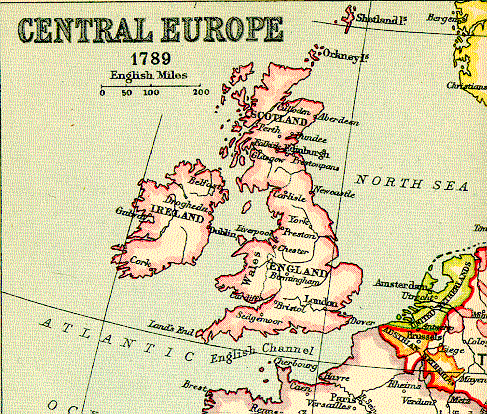 |
 |
 |
 |

The Industrial Revolution, beginning some time around the 1780s, eventually resulted in significant increases in British wealth (by 1800, Britain was the most industrialized state in the world). But it also meant disorder, especially in rural areas, as traditional familial and social structures were overturned. In London, too, there was considerable upheaval. The anti-Catholic Gordon Riots (1780), in which over 300 people were killed, were only the most visible sign of popular discontent. To complicate matters, George III suffered from a series of bouts of insanity, beginning in 1788. British national pride and prestige were seriously wounded.
Under the leadership of William Pitt the Younger, England made something of a comeback, reducing its debt by over ten million pounds. But the storming of the Bastille in 1789 divided the nation: more radical Britons (such as Godwin, Wollstonecraft, Wordsworth, and Coleridge) looked to the French Revolution hopefully and favored similar republican revolutions at home, while others -- most notably Burke, in his Reflections on the Revolution in France (1790) -- were more skeptical. Britain finally and reluctantly declared war on Revolutionary France in 1793, when the Terror had begun and France threatened to invade Holland.
Far from reducing the popular political discontent of the 1780s, though, the wars with France exacerbated it. In the early 1790s, calls for manhood suffrage and annual elections were common in pro-French circles, which had begun to form radical Jacobin societies. Pitt's counter-revolutionary government subjected these corresponding societies to considerable suppression, and by 1795 they ceased to meet. But political discontent was simply forced to go underground.
Things were going badly at home and little better abroad. The Irish Rising of 1798 was a reminder of how precarious Britain's colonial possessions could be. And there was the ever-present threat of a French invasion. Apart from the Battle of the Nile (1798), Britain had scored few important victories against France. The country was forced to assemble a militia, which at one time encompassed perhaps as much as a quarter of the adult male population. A series of coalitions with Russia, Spain, Holland, Sweden, Portugal, Siciliy, Austria, and Prussia produced mixed results but no definitive solution. A short-lived treaty with France (1802) seemed to promise peace, but held for less than a year; by 1803, the two countries were at war again. And the wars were extremely costly: Britain spent over a billion pounds, and in 1797, the Bank of England nearly declared bankruptcy, suspending all cash payments.
The middle of the first decade of the nineteenth century marked a watershed. In 1805, Admiral Nelson defeated the French and Spanish at Trafalgar, significantly reducing the danger of a foreign invasion. And when Spain rejected French rule in 1809, the tide began to turn against France. The Napoleonic Wars came to an end with the Battle of Waterloo (1815), when Napoleon was finally defeated.
In spite of the victory, the Napoleonic Wars left Britain deeply in debt and in a serious economic depression. New wealth was badly needed, and Britain looked to its growing empire, which was becoming the most important source of British income. The India Act of 1784, for example, increased British rule in India, and Captain Cook's explorations in the South Seas led to the colonization of Australia. (Another sign of Britain's management of its one-time colonies is the Act of Union of 1801 joined Great Britain with Ireland to form the United Kingdom.) This tremendous success in acquiring territory, from the Seven Years War through the Napoleonic Wars, produced a population of roughly 200 million people in British-ruled territories in 1820, more than a quarter of the world's population.
But the expanding empire did little to mollify the working class at home, whose political discontent was no doubt aggravated by the social upheaval brought about by the Industrial Revolution. There were riots in 1816 and 1817, leading up to the more significant Peterloo Massacre in Manchester in 1819. Economic conditions improved somewhat after 1821, and by the middle 1820s England was experiencing an economic boom. But popular discontent remained a serious factor in domestic politics, and there were frequent calls for social reform.
The tide began to turn at the end of the decade: Catholic Emancipation (1829) is an important milestone. And there were several attempts to pass sweeping reform bills around the time of George IV's death and William IV's succession in 1830; the reformers finally succeeded with the Reform Act of June 1832, which substantially increased the size of the electorate by granting suffrage to much of the middle class. Slavery was ended in the British colonies in 1833, and a new Poor Law was passed in (1834).